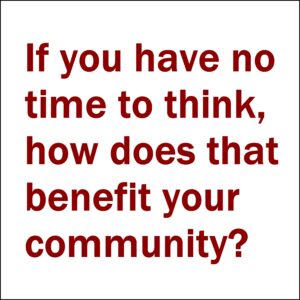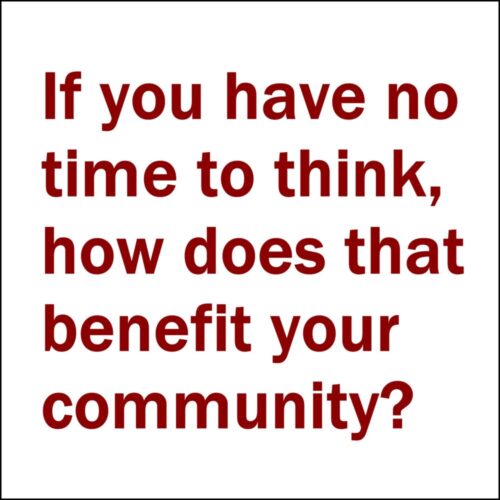In 2022, we asked our community to determine what’s next for our mission. Your answers fell into three categories:
- A place to learn about Catalytic Thinking
- Spaces to connect with other Catalytic Thinking practitioners
- Inspiration to experiment in your own work, to live in a space of inquiry.
When we shared an update with our community, noting the first steps we will be taking to implement what folks told us is important to them, the step most people responded to was this one:
“In the short term, we will be taking slow, quiet time to build first steps. That slow time will include taking time for recharging our batteries. If we are to create pathways to the outcomes you defined, we need to be energized and ready.”
Overwhelmingly, the response was some form of this:
I wish we could do that at our organization.
We could never do that at our organization.
You all are so lucky!
 First, let’s make one thing clear.
First, let’s make one thing clear.
We are NOT lucky. We are intentional about ensuring our people are at their best as we move forward. If we are exhausted and burned out, with no time to think, how does that benefit our community?
In our eJournal this week, we walked through the questions of Catalytic Thinking, to help you find ways to create space to recharge – time to think slowly, to catch your breath.
In a world that is constantly encouraging us to do more and more (and in the social change arena, that is usually amped up with the phrase “doing more with less”), what does it take to simply do LESS? Where might we cut back immediately, to have an impact on the physical and emotional health of our team?
It’s counterintuitive, but the reality is simple:
Stepping back to do LESS is often key for being able to accomplish MORE.
We hope the following ideas inspire you to come up with ideas of your own. And please share what YOU have done to create time to think in your own work!
Board meetings
As you saw in our What’s Next update last week, one way we will be taking slow time to think is to have our board meet less often. If issues arise that need their attention, we can convene for that purpose. Otherwise, we have put our monthly meetings on hold.
In your own organization, if your board took a break from meeting every month, would anything change? What might that break make possible for them? What might it make possible for your staff (especially the staff who spend time preparing for those meetings)?
Scheduling Off-Grid Time
Another example is an email out-of-office message from our partners at the Pennsylvania Association of Nonprofit Organizations.
“PANO staff is engaging in several days of Collective Care this week, from noon on Wednesday through Friday – intentionally setting aside time to plan, catch up on those little tasks that never quite rise to priority status, and more. I will be responding to emails/voicemails intermittently each day and appreciate your patience with any delays in communication. We are excited to dedicate this time to our internal wellbeing.”
In your own organization, what would need to be in place for ALL your staff to have a catch-up-and-think day or two? Not just the folks in the office, but people in the field, the support staff, the line employees?
No new projects!
We’ve also experienced the power of committing to “no new programs / projects this year.” One year, we posted signs all over the office saying “NO NEW PROJECTS.” Unless something was an emergency, no matter how seductive the opportunity, someone would point to the signs, and we would breathe again.
In your own organization, what would it make possible if you worked only on the projects you already have on your plate? What would you need to have in place, in order to say no to new projects for a whole year?
Scheduling “no meetings” time
One more, this one from Hildy. Every few months, Hildy marks entire weeks on her calendar as a “No meetings” week. Depending on her projects, sometimes that is once a month, and sometimes – like now as she is writing the book on Catalytic Thinking – it is every other week.
Just as one would not schedule an appointment at 2pm on Wednesday if you already had something scheduled at that time, she tells folks, “I’m not available that Wednesday; can we do the following Wednesday?” The key is to see that week as scheduled. It’s just scheduled for YOU.
In your organization, if you have a position that allows you to make your own appointments, what would need to be in place for you to mark out a full week for “no meetings”? What would you need to be assured of? And if you are not in control of your calendar, what would your supervisor need to be assured of, to allow you to take even one day per week as a “no meetings” day?
The work of making our communities more healthy, humane, equitable places to live is not easy. It requires focus, deep commitment and caring, a ton of energy, and a ton of work. We can only accomplish that if we are at our best. By asking the questions of Catalytic Thinking, we can focus on putting the conditions in place that will lead to success… for ourselves and for the people in our communities.

